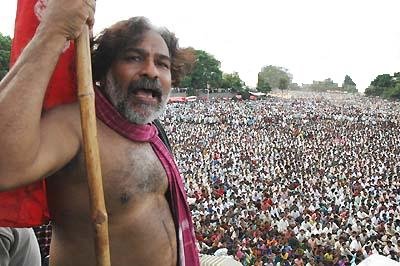
Gaddar in a meeting in Nizam College Grounds,Hyderabad - 2005
Gaddar (born as and also known as Gummadi Vittal Rao), is a pseudonym of a revolutionary Telugu balladeer and vocal Naxalite activist from the state of Andhra Pradesh, India. The name Gaddar was adopted as a tribute to the pre-independence Gadar party which opposed British colonial rule in Punjab during 1910s.
Early years
He was born in 1949 in Toofran village of Medak district. He comes from a poor dalit family and his parents Seshaiah and Lachumamma worked as labourers to earn a living. After completing PUC (then equivalent of 12th class) from a government junior college in Hyderabad he joined the Osmania University Engineering College to pursue a Bachelors degree in engineering but dropped out after the first year to earn a living.
Gaddar married a woman named Vimala. He has two sons, called Sureedu and Chandrudu as well as a daughter called Vennela.
Jana Natya Mandali(Peoples Dance Group)
He rose to prominence by singing highly emotional and stirring songs that were popular among the poor and the rural hinterland of the Telangana region notorious for the PWG (People's War Group) a Maoist organization that uses mainly violence to achieve its goals.
He established a song and dance troupe called Jana Natya Mandali which tours and performs in villages to gather support for the revolutionary ideologies. His style of singing involves use of high pitches in the local Telengana variant of Telugu, thus touching a chord among the locals as popular Telugu media and songs only show the fluent or neutral Telugu. His use of Urdu words is also seen to be a perfect fit since people from this region often mix a few Urdu words unlike the Telugu speakers from other parts of the state.
His songs were also used in many Telangana-centric movies enacted by various cine-persona from the Telugu film industry. Due to his affiliations with the previously banned party he was prevented from singing in public until recently. He is prominently visible on any stage by his trademark black shawl that is typical of the Telengana shepherd dress.
Wikipedia Link
Related Links
Rebel on the Mic: India's Maoist Dissident(Audio interview in english)
Listen to Gaddar's Revolutionary songs (Telgu )
Related Articles
Sepia Mutiny Article on Gadar by Amardeep Singh
namaste Gaddar bhaai....first of all i am thankful to the web designer of this site...nidra poye e janaanni lepaneeki kaneesam ee site ayina kontavarakaina useful ga untundemo...naakemi naa pellam biddalu sariga unte chaalu anukune janalaki koncham ayina melakuva vastundemo....evari kosam ee comrades satundlu.....evari force valla vaaru e naxalism lo join avutundlu.....nuvu, nenu, manandaram manakemi anukunesarike nelakorugutundlu...pallelalo polisodi baadalu padaleka em teluvani amayakulu nelakorugutunte....kaneesam ippudaina levandi nidra....nidra potunna o janaallara...
ReplyDeleteHalam patti polam dunnu nee cheyi
ekkupettina tupaki chusi ollanta jaladarinchi
saaginchina nee nadaka
kaarucheekatini saitam lekka cheyaka
kalam patti kavita raase.......
Evarantu needa raaka
chivarikantu todu leka
peenu gochi illu chere......
Amarajeevi R.K. aashayala naduma
kaviayina Koumudi kanna kalala naduma
Jana naadi meppondina Janardan jaadalo
Amarulayina annalaara
NIngikegisina akkallara
Laal salaam......mee andariki
Laal salaam..................
-----Praveen Kumar
The Mumbai Press Club gave a platform to Gaddar on January 10.The President,
ReplyDeletePradeep Vijayakar, quoting Andre Marlaux, said `art is a revolt against man's fate' and Gaddar's ballads are a classic manifestation of that.
In West Indies calypsos composed by those who could not stand wrongdoings have brought down governments. Gaddar's campaigns could have that kind of effect
Iyer